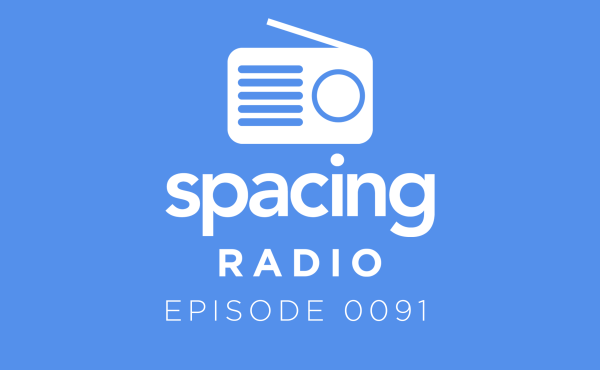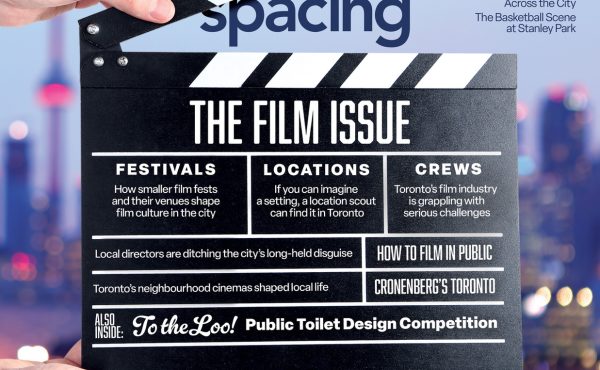
Greater Toronto residents would overwhelmingly support the concept of a Los Angeles-style regional sales tax dedicated to transit and infrastructure, according to a new poll conducted by Environics exclusively for Spacing.
The poll indicates that 74% of the respondents said they “somewhat” (49%) or “strongly agreed” (25%) with an earmarked tax, while only 26% said they were opposed (“somewhat opposed” 17%, and “strongly opposed” 9%).
The dramatic results suggest a significant number of GTA voters would back taxes that promise to relieve worsening vehicle congestion that now costs the region $6 billion a year in lost productivity, according to the Toronto Board of Trade. “The findings show public is primed and ready for a meaningful discussion about the future of transit in the GTA,” says Darren Karasiuk, Environics’ vice-president of corporate and public affairs.
Using an online survey (see method description at bottom of this post) rather than a random phone sample, Environics asked 1,436 respondents the following question:
“In 2008, the Los Angeles regional government held a binding referendum that asked residents if they would support a 0.5%increase to the L.A. County sales tax for 30 years, with the proceeds – estimated at around $40 billion – dedicated to rapid transit and some road infrastructure. If this sort of tax – with the proceeds clearly dedicated to transit and local infrastructure – was introduced in your municipality, would you support or oppose it?”
For Metrolinx, the GTA regional transit agency, and the provincial Liberal government, the most attention-grabbing detail about the finding is that the level of public support runs high right across the GTA, not just in the City of Toronto, with its high level of transit usage.
In the 905, the overall pro-transit tax figure was 70%, ranging from a low of 67% of Halton respondents to a high of 75% in York Region, which has seen rising rates of transit ridership in Markham and Richmond Hill in recent years.
The result comes just two days after Richard Katz, a key player behind L.A. County’s 2008 transit financing deal, delivered a sold-out lecture at the Munk Centre to explain how City of Los Angeles mayor Antonio Villaraigosa, a Democrat, won public support for a half-cent increase to the regional sales tax that will raise $40 billion over 30 years for twelve major transit and transportation projects, as well as operating funds. (The list includes LRTs, BRTs, a subway, and a highway expansion.)
Moderating Monday’s Munk event was Metrolinx chair Robert Prichard, whose organization has until June, 2013, to develop a plan to finance the agency’s $50 billion/25-year Big Move expansion strategy for the GTA and Hamilton.
The L.A. tax hike, known as Measure R, was approved by 67.3% of voters, just enough to exceed the mandatory super-majority required for all local tax increases. Ontario has no tradition of plebiscites for tax hikes and the populist concept remains highly controversial, although Mayor Rob Ford and some of his allies have called for City of Toronto referenda on decisions such as casinos.
While transit ridership in L.A. is low and used mainly by lower-income residents, the region’s horrendous traffic congestion created a kind of political tipping point that allowed Villaraigosa to assemble a broad-based coalition to pitch the sales tax hike. L.A. economic development officials estimated that the half-cent hike amounted to about $26 per person per year.
Villaraigosa, Katz said in his presentation, raised $3.5 million for the 2008 campaign to promote Measure R, using polling and research data to target key constituencies, including university students and seniors in the county’s affluent west side. Voters didn’t just approve the tax hike; Measure R laid out a detailed breakdown of the revenues, including estimated start and completion dates for the various projects. Shortly after the approval, Villaraigosa and his emissaries began pushing ahead a complicated finance deal designed to compress the construction period into a decade as a means of generating thousands of jobs for the region.
After the Munk event, Mike Del Grande, council’s out-going budget chair, said he generally supported the concept of a region-wide earmarked tax, as did York Region chair Bill Fisch, who said a sales tax is just one of several revenue tools.
What’s far less clear is who (or which group) would lead the charge for such a measure, and in what context. Ford, of course, has none of Villaraigosa’s leadership skills or vision, while the appointees on the Metrolinx board lack both public profile and political accountability. Nor it is obvious how a region-wide transit tax proposal would fit into the wider dynamic of a provincial election.
But the Environics poll does suggest that GTA residents — transit users and drivers alike — have become sufficiently fed up with the transportation status quo that they could be persuaded to dig into their wallets to finance a regional solution.
![]()
METHOD NOTE: Darren Karasiuk, of the Environics Research Group, says the online survey participants were chosen to provide a statistically relevant sample that is corrected to reflect regional demographics. The method, now used by many polling companies that have run into difficulty with traditional phone-based polls, is not to be confused with the non-scientific web polls that appear on many media websites.
photo by Wylie Poon





19 comments
Wow. That’s a pretty striking result. If anyone it any governing body champions a regional sales tax, they have a huge well of support to draw upon.
My main concern as John brought up is which politician is going to back a tax increase like this? We don’t have that kind of vision and frankly we don’t have politicians with any guts like that in the GTA anymore.
“..who would lead the charge for such a measure”?
I suspect a lot of people in Ward 16 would wish Karen Stintz go after such a job. We wouldn’t miss her in the constituency and it would be another big boost to her career as a professional politician. After all, she’s a big fan of the likes of Crombie, Pritchard and Miller.
Great artcile. It’s too bad the poll opens with the example of how Los Angeles brought in the new tax. I suspect hearing about another city doing it pushes the favourable numbers up.
That said, any move to create new revenues with public support could be the key to really getting things done. Having a stable source of funding is the only way major infrastructure projects will survive political changes.
I support the existing taxes I pay that go towards transit (I think enough is already going in). I AM ALREADY TAXED ENOUGH! As a taxpayer, I do not want to be forced it pay additional taxes to subsidize riders from outside of TORONTO. Why should I pay taxes that would be put into the GO Transit system if I am NOT a customer.
I think that the majority of the operating budget for a transit system(s) should come from the RIDERS. (Aside: Let’s get the politicians out of the planning mix and ALLOW Transit professionals plan and build the TTC.)
Subway on Sheppard to feed an already OVER LOADED Yonge line IS NOT the ANSWER! YONGE-UNIVERSITY-SPADINA line is at capacity and when their NEW extensions open, it will make the line even more crowded.
If you are going to build a subway line, PLEASE BUILD it from the NE or NW parts of the city to the DOWNTOWN CORE!
Broad-based support ACROSS the GTA is very encouraging. If it should happen it should be doled-out by technical need through Metrolinx, not by local politicians trying to win elections by gerrymandering through mythical subways.
Howie, where is the money to build your subways from the suburbs to downtown going to come from, if not taxes? Ford has already proven that the gravy train of free money by walking through city corridors firing those he found reading the Toronto Star and drinking Starbucks was a myth.
I think a lot of people, like Howie there, need to be educated about the fact that, just because you may not be a transit user, does not mean that you don’t benefit from its existence in the form of reduced congestion on roads. Fewer people driving into the downtown core from far-flung suburbs means less traffic on roads, which also means fewer idling cars and thus a cleaner city with less smog. Think about it.
So Howie, you’re griping about being taxed but you want a new subway line built? Does…not…compute…
This seems misleading to me as “somewhat (49%)” made up by far the largest chunk and it is hard to figure out what “somewhat” means. If there were hard numbers that said 0.5% means this amount out of your pocket over 30 years I would expect people to say no. Or, if people realized that transportation spending would be things that made sense instead of say having a subway every 2 blocks many would say no. This headline could have said “half of GTA residents wishy washy on Transit Tax”.
I would also point out that this 6 billion dollar number has become gospel although there is no actual proof of it. In fact every year or so the Board of Trades estimate goes up. In 2007 it was 2 billion. This oft quoted number has to be taken with a grain of salt.
“suggest that GTA residents — transit users and drivers alike — have become sufficiently fed up with the transportation status quo that they could be persuaded to dig into their wallets to finance a regional solution”. This poll suggests nothing of the kind.
I support tax for transit, I support road tolls (the only thing that actually reduces the number of cars on the road besides the price of fuel) but this story is wishful thinking and below the good work that John generally does.
ScottD:
You ignore that somewhat opposed (17%) and strongly opposed numbers (9%) are rather small. The total opposition (26%) to this hypothetical tax just beats those strongly in support (25%).
There isn’t anything wishy-washy about it.
Howie should rethink his User Pay position next time he visits his doctor, or god forbid, has to visit a hospital. Taxes are used for the betterment of society as a whole. Not everyone will benefit directly from everything a tax funds, but everyone tends to benefit indirectly.
@Howie
>I support the existing taxes I pay that go towards transit (I think enough is >already going in). I AM ALREADY TAXED ENOUGH! As a taxpayer, I do >not want to be forced it pay additional taxes to subsidize riders from >.outside of TORONTO. Why should I pay taxes that would be put into the >GO Transit system if I am NOT a customer.
Because these taxes will take more people off the roads, which will make your road based commuting experience better. You still get value out of this (less congested roads), the region gets more non-condo based construction jobs; everyone in the city gets something. That’s why it’s a fair tax, and the notoriously stingy Californian populace agreed to the hike.
>I think that the majority of the operating budget for a transit system(s) >should come from the RIDERS. (Aside: Let’s get the politicians out of >the planning mix and ALLOW Transit professionals plan and build the >TTC.)
This is already the case for the TTC, which gets 70% of its budget from fares.
@ScottD
>I support tax for transit, I support road tolls (the only thing that actually >reduces the number of cars on the road besides the price of fuel) but this >story is wishful thinking and below the good work that John generally does.
I share your ‘pay for transit’ approach to taxation & tolls, but I don’t agree this story is only wishful thinking. In the present climate of municipal politics, no money will realistically be raised for investment in transit infrastructure without broad-based popular support. As reported in the story, the LA model cannot be applied directly here; they won people over with a team effort lead by a hard working mayor with vision and consensus building skills, which we lack in the worst way. Reporting the results of this poll will hopefully continue the adult conversation about transit (h/t Hamutal Dotan @ Torontoist) our regional politicians have avoided for 30 odd years.
Forget the sales tax – the best thing to do is nothing. We have our LRT plans paid for — why do we need to spend more? And for the rest of us — newsflash — there is no transit solution for the way the outer suburbs have been built. They were built to repel transit — everyone knows that — everyone that bought a home knows it, everyone that read this knows it. So give it up. Until we start razing strip malls and knocking down big box stores we aren’t ready for transit.
I think that .5% of taxes currently collected going to transit is a great idea. Collecting more will not go over so well in the GTA. I’ve realized over the last 40 years that Torontonians in general want a better transit system but they’ll gripe over every penny they may have to pay for it. Suck it up folks, we can’t have something for nothing. Such as Mr. Mayor Ford’s subway system not costing the tax payers in the GTA anything. That is a pipe dream fueled by dillusion and nothing else. Above ground LRT’s are the most affordable way to go; it’s more easily accessible to the ridership and will not tie up traffic as he (The Mayor Rob Ford) proposes. My opinion is that people would prefer to see the outside environment instead of a tunnel when travelling from point ‘A to B’; as long it is efficient and well planned.
Like a few commentators above, I personally support a regional sales tax for transit, but I seriously doubt the validity of this poll. I don’t have any hard data to support my suspicion, but based on what I heard from my suburbanite friends, I’d be hard pressed to believe 50% of them would support a sales tax increase, let alone 74%.
An unfortunate push poll, but still a push poll.
As valid as Forum’s surveys on transit that led to asking about Ford vs. Stintz vs. Vaughn.
Should have at least taken out the “estimated at around $40 billion ” figure as there is no way we’d raise that amount.
Matthew Blackett> Matthew you are such a great guy that I think your post makes my point. : ) I agree with the concept behind the story, but this poll hardly suggests anything except that there is a huge wishy washy middle. If the poll said “49% of residents want subways somewhat” people here would be all over that as being misleading. I am for road tolls, transit tax, and millage based taxation and I also believe that Torontonians have low taxes overall. So I am with the plan so to speak but as a journalist I find the numbers in this study, and the assumptions being drawn, to be a stretch.
@Howie:
Coming from a suburban person – you do not pay high taxes in Toronto, it’s probably still half of what a person in almost any GTA suburb would pay on an equivalent house with less services.
Your statement with regards to a subway line connecting the downtown core with the NE/NW of the city I do agree with, and this is basically what the Downtown Relief Line could provide to the inner suburbs of the city. However, since the TTC hasn’t made money since being forced to expand outside of old Toronto’s city limits in the 1950s and then subsequently lost the 50% subsidy in return for providing transit to these boroughs, it has not got the cash flow to invest money in something that costs $300M/km. This is something that road tolls could help build, along with better transit infrastructure in the outer suburbs.
Really what I think should happen is that Metrolynx should take over all public transit in the GTA + Hamilton, merge it into one system and take over the 400-Series highways within the area. This would make it similar to Transport for London and the Metropolitan Transportation Authority (NYC) and would give it control over the major transport systems in the area and plan with long-term, unified goals in mind that would hopefully allow it to expand transport and alleviate traffic through coordination.